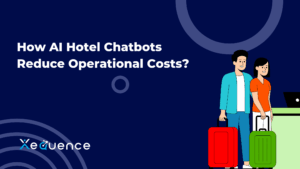
Chatbots are becoming increasingly important and valuable
Chatbots are becoming increasingly important and valuable in our digital world. It is being adopted in a wide range of industries, from healthcare to finance to retail. Continued advancements in AI and natural language processing lead to even more personalized and intuitive experiences for users. The future of AI Chabot’s is very promising, as artificial intelligence technologies continue to advance. The types of chatbots that are developed in the future will depend on the needs and preferences of users, as well as the specific applications that businesses and organizations are looking to address. Here are some potential developments that we may see in the
Future of AI Chabot:

- Better Natural Language Processing: AI chatbots will continue to improve their ability to understand and respond to natural language, making conversations more intuitive and engaging for users.
- Enhanced Emotional Intelligence: AI chatbots may be developed with emotional intelligence, allowing them to understand and respond to users’ emotional states, and adapt their responses accordingly.
- Increased Personalization: AI chatbots will become even more personalized in the future, using AI to better understand user preferences and behavior and provide tailored recommendations and solutions.
- Improved Multilingual Support: AI chatbots may be developed with better multilingual support, allowing them to converse with users in a wider range of languages and dialects.
- Integration with Other AI Technologies: AI chatbots may be integrated with other AI technologies, such as voice assistants and machine learning algorithms, to provide even more powerful and seamless conversational experiences.
As AI Chatbots become more sophisticated and capable, they will likely play an increasingly important role in our digital lives, providing us with convenient and accessible ways to interact with businesses, organizations, and other users. In the future many different types of Chabot’s could be developed:
Customer Service Chatbots: These chatbots will be used by businesses to provide customer support and answer common questions, such as those related to product features, pricing, and shipping.
Virtual Sales Agents: These chatbots will be designed to help businesses sell products and services online, by providing personalized recommendations and guiding users through the purchase process.
Educational Chatbots: These chatbots will be designed to help users learn new skills or information, by answering questions and providing relevant resources and tutorials.
Health and Wellness Chatbots: These chatbots will be designed to help users manage their physical and mental health, by providing advice and support on topics such as diet, exercise, and stress management.
Social Chatbots: These chatbots will be designed to help users socialize and connect with others online, by providing conversation starters, games in more interactive ways.
Additionally, as AI chatbots are always learning from their interactions, they can eventually modify their responses in response to various patterns and new circumstance-based queries. This means that they can be used for a variety of purposes, such as assessing a customer’s emotions or speculating about what a website visitor is looking for.
It’s not hyperbole to claim that AI Chatbots is rapidly turning into a necessity for both B2B and B2C sellers. Brands that have adopted this technological transition earlier than their competitors have an advantage over those that have not yet taken steps toward automation.
Recent Posts
Newsletter
Get regular updates on data science, artificial intelligence, machine
You may also like

AI Travel Assistants: The New Personal Travel Planners

5 Things an AI Travel Assistant Can Do in Seconds

How AI Hotel Chatbots Reduce Operational Costs?




